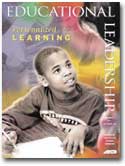This issue of Educational Leadership focuses on how teachers can shape instruction to meet the unique needs of learners. At present, though, there is an even stronger trend toward creating common standards for all students. Are these common standards incompatible with the ideals of personalized learning?
The current approach taken by the proponents of Tougher Standards is incompatible with personalized learning and with the interests of kids at the —s, and, ultimately, I think it is incompatible with excellence.
The content standards begin, "All students will be able to . . ." so that even before you look at the expectations, you notice that the standards are uniform. The message here seems to be that individual differences either don't exist or are illegitimate and should be ignored. This wording willfully disregards the fact that not all kids learn at the same pace or should be expected to do so.
Most standards are highly specific. Often they consist of hundreds of detailed items, facts, and subskills that students have to know. Harold Howe II, the former U.S. Commissioner of Education, was once asked what national standards should be like if they had to be issued. He summarized half a century's worth of wisdom in four words: "As vague as possible." The more narrow and rigid the requirements are, the less responsive educators can be to what distinguishes one circumstance from another, or your child from mine.
Does that mean that you would only support content standards if they weren't precise about common outcomes for all students?
We need to make several distinctions here. "Horizontal" standards offer guidelines for shifting how teaching and learning happen in classrooms. All students deserve the chance to do meaningful problem solving in math class rather than to be turned into human calculators, and to learn to read and write by doing real reading and writing rather than to be forced to plod through skills devoid of context. Standards that move instruction in those directions are terrific—as long as they're not just shoved down teachers' throats, of course.
What I object to are "vertical" standards: the mindless, macho talk about "raising the bar" in which the pedagogy remains the same but we do it longer or harder or give more tests.
Another distinction has to do with the student's age. Some specificity is appropriate if we're talking about what we can expect from students by the time they graduate from high school. But it's entirely different to talk about what all kids must know before leaving the 2nd grade. That is outrageous from a developmental perspective. Even at the high school level, though, broad guidelines of intellectual competence are more helpful than the list of facts and skills that are showing up on high-stakes exams: You recite the right details about the Industrial Revolution, or distinguish correctly between xylem and phloem, or else you can't graduate.
The primary effect of requirements like these won't be to make schools excellent but to force a whole lot of kids to drop out. We'll end up denying diplomas to those who can't or won't commit to temporary memory a bunch of facts that very few adults know by heart. And the Tougher Standards contingent is applying the same thinking to elementary schools by forcing more and more kids to repeat a grade if they don't pass a test—never mind whether the test is reasonable, never mind why they're having trouble, and never mind research that shows retention to be a disaster for the students.
A lot of horrible practices are justified in the name of "rigor" or "challenge." People talk about "rigorous" but often what they really mean is "onerous," with schools turned into fact factories. This doesn't help kids become critical, creative thinkers or lifelong learners. In fact, the more we cave in to demands for Tougher Standards, the less schools are able to reach those more ambitious goals.
But plenty of good teachers are innovative, yet their students score well on whatever test you can point to.
The extent to which that happens depends on the nature of the test. The more we define "raising standards" as raising scores on norm-referenced, skills-based, multiple-choice tests, the more we try to fill passive vessels full of facts instead of helping kids engage with ideas. If we use more meaningful, open-ended performance-based exams, then we can maintain some decent teaching in the classroom. However, we may still be increasing the test designers' authority to decide what gets taught. The worst possible combination is a basic-skills, fill-in-the-blank test and a high-stakes environment where people are pressured into raising the scores.
Only someone who knows nothing about teaching and learning could support such practices. The best teachers understand the need to involve students in designing their own projects, allowing them to develop a style of, and a proficiency at, intellectual exploration. Teachers need the flexibility to take unexpected detours. In one math class I visited, for example, students ended up taking an entire period to debate the definition of a pyramid. Fortunately, that teacher could be flexible enough to allow this sort of student-driven, in-depth learning because those kids didn't have to take a standardized test.
That's why I say that the Tougher Standards and accountability movement is squeezing the life out of schools. I'm finding example after example of teachers who, at best, have to carve out portions of their week to prep kids for horrible tests before they can get back to the real learning. And sometimes the real learning never happens. Kids are being deprived of recess, are having to stay longer at school during the day, are having more and more homework piled on them. The result isn't a deeper understanding of ideas or a commitment to continue pursuing learning. Quite the opposite.
What is an appropriate role for testing in schools and in classrooms?
It's legitimate to collect information—carefully and only occasionally—about a student's level of understanding and improvement, using meaningful measures. The purpose is to enhance the quality of students' learning—without undermining their interest in learning.
For starters, any test must be open-ended so that students can generate options and explain their answers, as opposed to filling in ovals. And the content of the examination has to reflect what we value, what we honor in our society—the kinds of things that we think people really need to know. This is obviously not the case right now because very few of us as adults could pass a lot of these high school proficiency tests.
Learning doesn't take place at a district or state level; it takes place in a classroom. Therefore, the assessment should be focused on students' learning over time by the person in the best position to judge the quality of that learning. There's an inherent problem with any one-shot test that's designed and then scored by somebody far away.
So you see quite a bit of usefulness for assessment constructed by teachers to meet their needs, but very little usefulness for district-mandated tests, state tests, nationally normed tests, and so on?
Right, although I would add that a teacher-designed—and perhaps externally validated—assessment doesn't meet only the teacher's needs. If it's done right, it also meets the needs of parents and citizens to make sure that the teachers and schools are doing a decent job. Parents want to be reassured that the teacher's judgment is reasonable and that, in the face of largely exaggerated press reports about the failure of our schools, our kids are being well educated.
Of course, the best way to find out what's going on in the school is to visit and look around: watch whether kids are grappling with complex ideas, as opposed to being hunched over worksheets. If kids come home babbling excitedly about something they've been doing in class and just figured out, that's a powerful signal that something is going right.
What do you see when you visit classrooms where teachers are personalizing the curriculum?
The kind of teaching that responds to different interests, talents, and proclivities of different children rarely takes place in a classroom where the teacher is in the front of the room disgorging information and covering a preset curriculum. In many traditional classrooms, the only difference between one kid and another is how fast each moves up a single, adult-constructed ladder. Real responsiveness to individual differences entails maximizing kids' participation in deciding—not just alone, but with one another—what they're going to explore and how and when and with whom and why. And then the students will play a big role in figuring out how to assess the success of what they've been up to.
Personalization itself looks different in different settings and for different ages, but roughly speaking, the strategies described as constructivist, holistic, collaborative, and learner-centered provide the possibility of learning that is responsive to what distinguishes one kid from another. It doesn't guarantee it, however. One can imagine a version of cooperative learning, or a hands-on lesson, that was "one-size-fits-all." Traditionalists have indignantly insisted that all kids don't necessarily learn best with a given progressive method. My response is, first, that a lot more kids learn better by doing something than by listening, by having some choice rather than none. Second, many of these critics seem to be born-again supporters of specialized instruction. They've long supported classrooms that are the opposite of responsive to individual differences.
You've been quite critical of traditional classrooms. Many commentators, though, feel that schools are too interested in nontraditional techniques, that educators tend to pick up every fad.
It's interesting that only progressive practices are labeled fads even though that epithet would seem to be at least as appropriate for the latest version of, say, explicit phonics-based instruction, where kids can read only stories that match the skills lesson.
For my new book, I combed the literature to see what's really going on in schools, to see whether there's any truth to the conservative claim that a monolithic "educationist" establishment is driving good old traditional practice underground and turning our schools into progressive experiments. My conclusion, based on research and my own visits to schools all over the country, is that this claim is so audacious as to be downright comical. Across the grade levels and the disciplines, American schools are stultifyingly traditional, far more similar to what they were like 30 years ago than they are different.
Most students still spend the day with kids their own age. Most schools still use awards assemblies and letter or number grades. Most classes, especially in high school, continue to use textbooks. Most kids still have little to say about what they're being taught. Most math teaching is still about skills more than about understanding. Whole Language remains the exception rather than the rule; a recent survey found that most primary-grade teachers, despite paying lip service to a balanced approach, continue to teach discrete phonics skills to all kids, even to the majority who could learn in other ways. In short, progressive practice, despite its powerful research backing, continues to be present in only a tiny minority of classrooms around the country.
This assessment, by the way, comports with that of most serious scholars, including John Goodlad and Larry Cuban. But notice its significance. If traditionalists are right that our schools are in trouble, it's hard to argue that progressive practices are responsible if those practices are actually quite rare. In fact, the argument is turned on its head. If students aren't achieving the way we'd like, if they lack a disposition to learn, it may be precisely because schools continue to be so traditional. Indeed, that's exactly what the latest international mathematics comparisons suggest: Our kids are at a comparative disadvantage because the "back to basics" folks have won.
Have you rethought your theory of motivation, discussed in Punished by Rewards, now that you're a parent?
The research demonstrates that people who do something to get a reward tend to do it less well and typically lose interest in the task itself. Everything I've seen in my own house is consistent with those data. I will admit that as a dad, I have a fresh appreciation of how tempting it is to use carrots, stickers, and other implements of control on children who just won't go to bed when you want them to. But my view hasn't changed at all about the wisdom of trying to resist that temptation. It takes a lot less time and skill and courage to promise a child a sticker if she brushes her teeth or to give her a "time out" if she acts up or to tell her, "Because I said so." But my wife and I are constantly finding reasons to reaffirm that, ultimately, it makes more sense to work with our daughter than to do things to her.
That also includes resisting the temptation to constantly fling judgments at her, including positive judgments. If anything, now that I'm a parent it's even harder for me to listen to what has become a verbal tic for a lot of adults: "Good job!" Every time parents and teachers praise kids, they're telling them how to feel about what they did, stealing from them the opportunity to reflect on what they've done themselves and take genuine pride in it. My experience as a parent confirms that what kids really need from us is unconditional support, acknowledgment, encouragement, and, occasionally, informational feedback. What they do not need is an adult following them around saying, in effect, "You've met my standards, and I will dole out approval based on your continuing to do so."
In Beyond Discipline, you write that the more we manage students, the more difficult it is for them to become sophisticated thinkers. Although teachers often fear losing control in a classroom, the opposite of control is not necessarily chaos.
Exactly: This false dichotomy is routinely used to justify unnecessary control over students. After I wrote Punished by Rewards, it became increasingly clear to me that underlying the particulars of grades or praise or timeouts is the fundamental issue of how willing we are as adults to share some of our authority with students. It's hard to ask kids how we might solve a problem together because then we no longer have unilateral control over them. And that is frightening. It carries with it a whiff of something utterly unfamiliar and terrifying to most Americans: democracy.
I'm talking here about letting people—even small people—learn to make decisions about their own lives. Kids who are told what to do all day aren't developing socially or ethically the way they could be, just as kids are not developing intellectually in a classroom driven backward by demands for Tougher Standards.
Over the years, you've articulated a very coherent view of what schools could be. Through the course of your own education, how did you come to the views about things like control in the classroom, appropriate curriculum, and so on?
Well, there's no single cause. My education was an uninterrupted exercise in low-level control with relatively few opportunities to experience real quality learning until I got to college.
In elementary school, I was a good student, but I was also a rebel. Once, in 5th grade, when a teacher gave us some busywork to do, I thought I might as well call it what it was, so I neatly headed my paper with my name, the date, and the word "busywork." This did not go over well. In a way, I've been rebelling against that stuff ever since.
But that doesn't mean I had a clear sense of how learning happens or what teaching could be like—even when I became a teacher. I did stuff that makes me cringe in retrospect. What I've learned about teaching and learning has been from watching teachers more talented than I, from reading the work of thoughtful educators, and from reviewing and thinking about research. I test these ideas out in various ways, and people are often kind enough to challenge my thinking. Which is only fair, considering that's what I'm doing for them.





